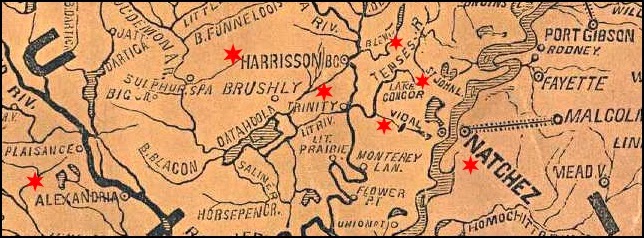The following transcription is from a collection of letters written by Union and Confederate officers during the Civil War. Catahoula Bank in Harrisonburg and Jonesville provided a complimentary transcription of this collection in 1966.
Hdqrs. Third Brigade Fourth Div.
17th Army Corps
Natchez, Mississippi
September 7, 1863
CAPT. W. H. F. RANDALL
Asst. Adjt. Gen. Fourth Div.,
Seventeeth Army Corps.
CAPTAIN: I have the honor to submit the following report of the part taken by my command, consisting of the Twelfth Wisconsin, Col. George E. Bryant; Fifty-third Indiana, Lt. Col. Richard Ritter; Thirty-second Illinois, Maj. George H. English; and Fifteenth Ohio, Spear's Battery, Lieutenant Burdick, in the expedition to Harrisonburg, La.
On Tuesday the 1st instant, in pursuance of orders from Brigadier General Crocker, I crossed the Mississippi River with my command, and marched out on the Trinity road to Lake Concordia and bivouached for the night.
At daylight on the morning of the 2nd instant, my command was on the march on the Trinity road, and at 9:30 A. M. I arrived at Cross Bayou, and commenced ferrying by means of a small flat. At 10 A. M. Colonel Malloy, of the Seventeenth Wisconsin Mounted Infantry arrived at the bayou and reported that he had left Black River, opposite Trinity at 5 A. M. that morning, in consequence of having skirmished with the enemy, and expended all or nearly all of his ammunition. At 3 P. M. my entire command was on the west side of the bayou, including the transportation of the Seventeenth Wisconsin, and the pontoon trains, which had been placed in my charge by General Crocker. At 3:20 P. M. I resumed the march (Colonel Malloy having one in advance) and halted at sunset within three miles of Trinity, having marched 23 miles.
At 5:35 A. M. of the 3d instant my command was moving at 6:30 A. M. it was at Black River, opposite Trinity. By 10 A. M. Captain [ineligible] had three pontoon boats in readiness and I crossed my command, leaving all my transportation on the east side of the river, excepting one ambulance and one ammunition wagon to each regiment. Here I received orders from General Crocker to press on to Harrisonburg by the left hand road.
Leaving Trinity at 3:50 P. M. I marched until 7:40 P. M. and halted 9 miles north of Trinity, and 2 miles south of the junction of Trinity and Alexandria roads. I received a message at 11 P. M. from Colonel Malloy, stating that he was at the junction with his command, and that the enemy, from 2,000 to 4,000 strong was approaching from the west on the Alexandria road. Upon the reception of this intelligence I sent an order to Colonel Malloy to send four companies out on the Alexandria road with instructions to obtain information of the strength and whereabouts of the enemy; and I moved with my command over a difficult road to the junction where I arrived at 3 A. M. on the 4th instant, and formed in line of battle across the Alexandria road. I remained in this position until 6:20 A. M. and not hearing from the reconnoitering party, I determined to leave Malloy to look to the rear, and move on to Harrisonburg when within 3 or 3 1/2 miles of Harrisonburg I was overtaken by courier from Colonel Malloy, with information that he, Malloy, had encountered the enemy 4,000 strong, on the Alexandria road, 5 miles from the junction, and that he was skirmishing with him and gradually falling back. I immediately counter-marched my command, and arrived at the junction at 7:45 A. M., and formed in line of battle as before. About this time General Crocker arrived, and I reported to him what had transpired.
About 8:30 A. M. Col. Hall arrived with the Second Brigade and formed on my left. I remained in this position until I received orders from General Crocker to resume the march in the direction of Harrisonburg, at which place I arrived at 11:40 A. M. and rested until 5 P. M., when I received orders from General Crocker to return to Natchez, by the same route, following the Second Brigade. About dark I halted at a point 2 miles west of Harrisonburg, and rested until 5 A. M. next morning, the 5th instant and resumed the march, arriving at Trinity 11:30 A. M., when I received orders from General Crocker to cross the river and remain on the opposite side until the mounted infantry arrived and the pontoons were ready to be taken up, which I did. After crossing Black River I marched 4 miles and halted at 6 P. M. on the Tensas River.
At an early hour on the morning of the 6th instant my command was on the march and at 6:30 P. M. I halted near Vidalia, having marched 94 miles in less than 5 days. On the morning of the 7th instant I re-crossed the Mississippi and returned to my old camp.
Considering the excessive heat and the obstacles encountered in crossing rivers and bayous, the expedition is remarkable for the length of time in which it was made. It affords me pleasure to be able to say that, although the march was fatiguing and arduous, the men endured it with fortitude and patience characteristic of good soldiers.
I have the honor to be, very respectfully, your obedient servant,
W. Q. GRESHAM
Brigadier General
**********
He was appointed Postmaster-General by President Chester A. Arthur in 1883. Gresham later served as the Secretary of Treasury in the Arthur Administration and Secretary of State in President Grover Cleveland's Administration.
Source Citation:
U. S. Department of State, Office of the Historian, Biographies of the Secretaries of State: Walter Quintin Gresham.



No comments:
Post a Comment